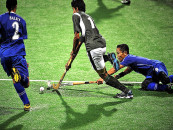World Intellectual Property Day: Patent and copyright laws key to preserving traditions, says Saleem
Ways to preserve national identity at a panel discussion on World Intellectual Property Day at Lok Virsa.

Globalisation may be stripping away the traditional identity of South Asia including Pakistan but all is not lost. South Asian Association for Regional Cooperation writer and historian Ahmed Saleem suggested patenting and copyright laws as ways to preserve national identity at a panel discussion on World Intellectual Property Day at Lok Virsa on Thursday.
He cited the example of India challenging a US-based company in 2000 for patenting basmati rice. That was the first time a government in a developing country had challenged an attempt by a US company to patent staple food and crops. Thus, he said, intellectual property goes much further than just art, literature and culture.
Instead of the global theme of “Visionary Innovators”, the discussion centred on traditional knowledge, folklore and intellectual property rights in Pakistan.
Karim Johar, a social activist, commented, “Majority of artists in Pakistan don’t even know such rights and laws exist to protect their intellectual products.”
He added that artists hardly get by on what they earn through their craft and are “leading disastrous lives.” He mentioned Pathanay Khan as an instance of a “revered” Pakistani artist who was never compensated beyond an iconic stature.
Centre for Civic Education Executive Director Zafrullah Khan addressed the conflicting nature of knowledge itself, “Knowledge should be shared and be made of use but if the creators of knowledge aren’t appreciated and compensated, it’s unfair and demotivational.”
He noted that even academics and journal submissions in top universities such as John Hopkins don’t compensate writers for submissions but charge a fee from readers.
Kaleem Jabbar, a social activist from Gilgit-Baltistan, said intellectual property needs to be traced through history, “so we can call ours what is truly ours.”
In that vein, Lok Virsa Executive Director Khalid Javaid said they started a nation-wide project to record, document and preserve all components of the Pakistan’s traditional knowledge since its inception in 1974.
A series of audio-visual cassettes, CDs and DVDs were published. However, due to no intellectual property rights introduced in Pakistan at that time, most of Lok Virsa’s products got pirated.
He hoped the growing awareness about intellectual property rights will ensure that others will not suffer the same difficulties that Lok Virsa did.
The panel discussion was organised by Rural Development Policy Institute, Centre for Culture and Development and Lok Virsa.
Published in The Express Tribune, April 27th, 2012.



















COMMENTS
Comments are moderated and generally will be posted if they are on-topic and not abusive.
For more information, please see our Comments FAQ